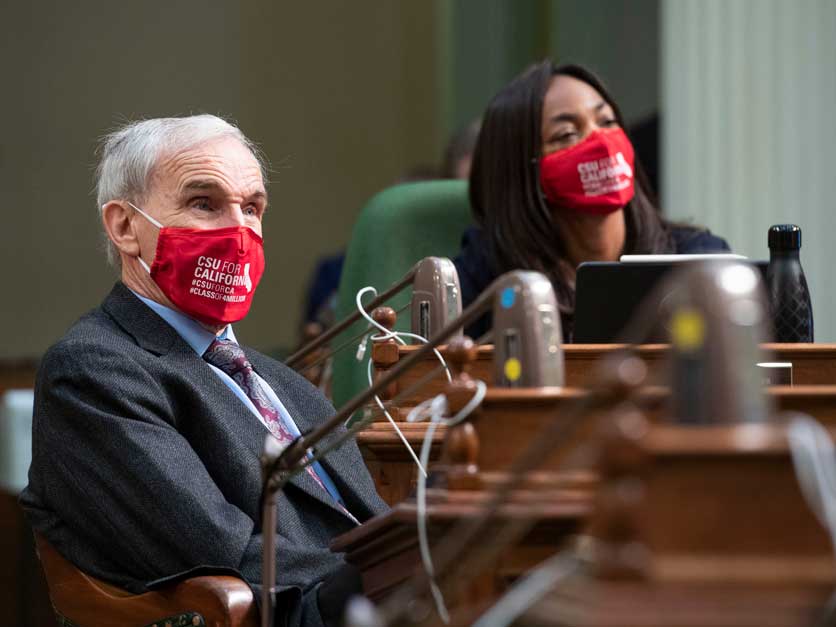Gov. Gavin Newsom issued an executive order in March aimed at protecting Central Valley drinking water wells as the drought deepens, adding new delays for well drilling. Farm and business groups are now pushing back on a bill in the Legislature that would permanently codify the order into state law and possibly weaken a tool growers have long relied on to survive droughts.
“I'm incredibly concerned about what's happening right now,” Casey Creamer, president and CEO of California Citrus Mutual, told the State Board of Food and Agriculture last month.
Creamer worried the governor’s “ill-advised order” is leading to further delays for growers since counties have issued moratoriums on new permits while they interpret the order. He argued that the groundwater sustainability agencies (GSAs) tasked with implementing the order are already short staffed and racing to meet Sustainable Groundwater Management Act (SGMA) deadlines.
Those issues are now surfacing in the Assembly as lawmakers attempt to minimize drinking water impacts as the drought expands into a third year.
Assemblymember Rebecca Bauer-Kahan authored a measure that would have required GSAs to address impacts to domestic wells in plans submitted for SGMA. The bill would have required the small agencies to also compensate those well owners for any additional energy costs they incurred from having to pump groundwater at greater depths, as well as for any costs for delivering water after a well goes dry.
The California Farm Bureau and other groups opposed the bill, arguing SGMA is best achieved locally and needs time to succeed. Bauer-Kahan pulled the measure and instead signed on as a coauthor to a bill that would extend a mandate at the center of Newsom’s executive order to continue beyond the governor’s drought emergency proclamation.
 Asm. Steve Bennett, D-Ventura
Asm. Steve Bennett, D-Ventura“All this bill does is simply say the groundwater sustainability agency needs to be checked in with,” said Asm. Steve Bennett of Ventura, while introducing Assembly Bill 2201 to the Water, Parks and Wildlife Committee last week. “We have had a number of years with SGMA to try to find out what's working and what's not working. And we simply have one area where we have a problem.”
In supporting the measure, Kyle Jones, a policy director at the Community Water Center, described California as plagued with perpetual drought and warned lawmakers to expect more executive orders if they did not act on the legislation.
“It's better that we find a workable solution through the Legislature rather than relying on emergency orders,” said Jones.
Ruth Martinez, a board member of the Ducor Community Services District in Tulare County and a former farmworker labor organizer, shared her community’s experience of nearly losing a drinking water well last year after the county permitted an agricultural well across the street.
Under the bill, a farmer hoping to drill a new well to counter the lack of surface water deliveries during the drought would need a permit from the local GSA. The agency would determine if the proposal would impact nearby wells or cause subsidence that could damage infrastructure like roads or conveyance canals. The bill would deny permits for any farms within a basin that the Department of Water Resources has placed on probationary status while the GSA revises its groundwater sustainability plan. GSAs would have six months to develop a process for issuing permits once the bill becomes law.
Bennett collaborated with the Association of California Water Agencies to clean up parts of the executive order and ensure the mandate is not overly burdensome on GSAs, he explained.
Conservative lawmakers, agricultural interests and business groups, however, have charged that such a state mandate erodes a central component of SGMA—one that the parties had fought for as part of a compromise under the original 2014 legislation.
“This bill completely undercuts local control—the key tenant underpinning the entirety of SGMA,” said Bob Reeb, a policy advocate representing the Valley Ag Water Coalition and the Solano County Water Agency.
The coalition, which consists of 43 water districts and companies throughout the San Joaquin Valley, argued that both the measure and the governor’s executive order override county ordinances for well permitting and would lead to no new wells, increased litigation and lengthy environmental reviews for every well permit application. Reeb called it impossible for a GSA to assess the potential impacts to nearby wells and infrastructure, and pointed out that SGMA already authorizes GSAs to impose spacing requirements and regulate the construction of new wells to minimize impacts.
He criticized the bill for applying a broad brushstroke to all basins, rather than just critically overdrafted ones, and argued the vast majority of medium- and high-priority basins are already sustainably managed.
Looking for the best, most comprehensive and balanced news source in agriculture? Our Agri-Pulse editors don't miss a beat! Sign up for a free month-long subscription.
Republican Asm. Frank Bigelow of O'Neals worried that GSAs would trump local land rights under the measure, essentially taking water rights away from landowners.
“There's just no evidence that’s saying it’s taking away local control,” countered Bennett. “It's actually giving local control to the local GSA.”
He dismissed the arguments as simply misrepresenting what the bill does and noted the mandate only applies to basins that have GSAs, reasoning those without them are managed sustainably. He said the bill would fill a critical gap in SGMA by providing GSAs enough authority to limit the number of new wells in a basin and suggested that GSAs are too lenient with farmers, since they “generally have a very strong representation from the ag interests.”
 Asm. Frank Bigelow, R-O'Neals
Asm. Frank Bigelow, R-O'NealsWhile Bennett promised the bill would not take away water rights, he called for the Legislature to consider overhauling the ministerial process that counties use to approve well permits, labeling the system as inadequate for not including enough discretion or analysis and allowing for negative impacts.
His frustration with the ministerial process was rooted in his experience as a longtime Ventura County supervisor. At the height of the 2012-16 drought, the board of supervisors issued a controversial two-year moratorium for new well drilling until the local groundwater management agency could analyze each proposal and develop a plan for protecting local supplies.
“It was bitterly fought until we did it,” said Bennett. “And when we did it, everybody said it was the best thing that happened.”
Dozens of farmers thanked him for protecting their wells, he recalled, explaining that ag interests were terrified of too many nearby wells going into the ground.
The fear of losing local control has resurfaced with AB 2201 because “there is an incentive for people who extract water to always oppose anything that might affect their ability to take water out of these important overdrafted aquifers,” he said.
Bennett pleaded with committee members to consider the impacted families when casting their votes on the bill and cited state data showing that about a thousand households lost water in the San Joaquin Valley last year.
Yet a similar argument arose in opposition to Bennett’s bill. Brenda Bass, a policy advocate for the California Chamber of Commerce, warned the bill would exacerbate the impacts of SGMA. Researchers expect up to 1 million acres of farmland will go fallow due to SGMA over the next 20 years, along with 85,000 jobs and billions in annual farm revenue lost.
“In the San Joaquin Valley agriculture is the main economic driver, with many industries and jobs tied directly or indirectly to farming, such as transportation, finance and more,” said Bass. “Further limiting the water supply for crops means that Californians may have an even harder time accessing affordable and healthy fruits and vegetables.”
The committee passed the measure along party lines.
For more news, go to www.Agri-Pulse.com.


